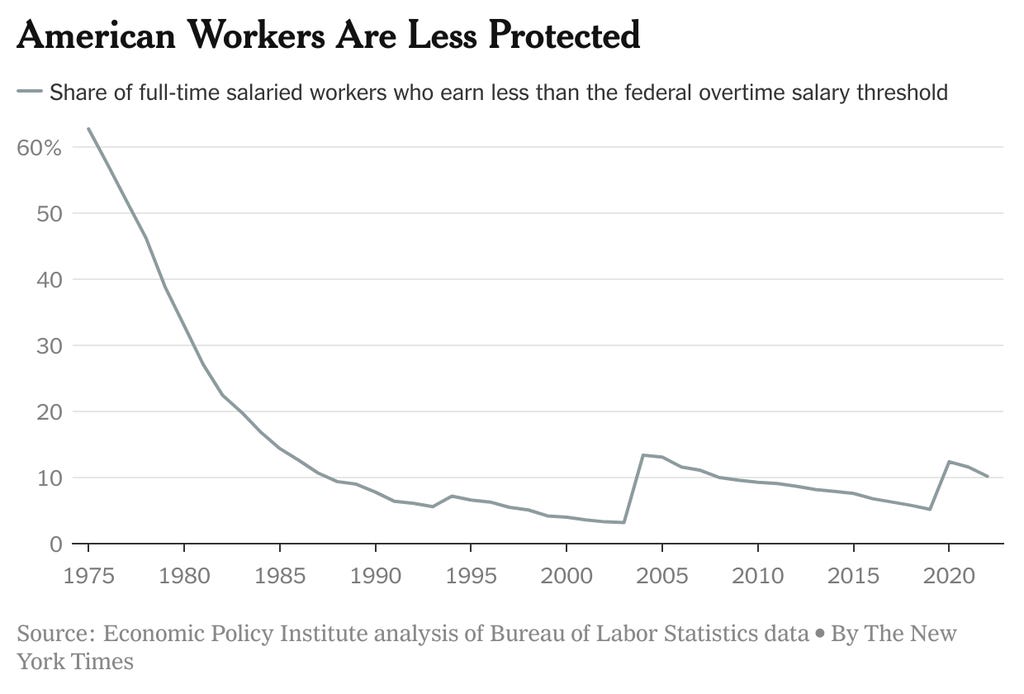An Atmosphere of Trust
Annette Baier | Overtime | From the Archives | How is Barnes & Noble Thriving? | Subversion

Quote of the Moment
Exploitation and conspiracy, as much as justice and fellowship, thrive better in an atmosphere of trust.
| Annette Baier, Trust and Antitrust
Several of the inputs for this newsletter issue relate to techniques that businesses use to quell disaffected workers and set the bar for what truly democratically-inclined businesses should aspire to.
Overtime
Peter Coy looks under the rocks to see how businesses skirt their legal obligations to pay overtime by inflating titles to make rank-and-file workers seem like managers. Managers have been exempted from overtime since the Fair Labor Relations Act of 1938 came into law:
[The Act] says that if employers want certain people to work more than 40 hours a week, they must pay the employees at their regular hourly rate plus 50 percent — time and a half. It protects virtually all hourly workers as well as salaried workers below a certain pay threshold and even salaried workers who are above the pay threshold but are not in executive, administrative or professional jobs.
[…]
A lax overtime rule hurts good employers that treat their workers well, Shierholz said, since “employers who are willing to exploit their workers have a competitive advantage.”
All hourly workers are entitled to overtime, as are all salaried workers earning less than $35,568 a year. The problem comes above the salary threshold, where managers don’t get overtime. The new economic working paper found that listings for salaried positions with managerial titles are almost five times as common just above the salary threshold as just below it — which seems to be prima facie evidence that employers are gaming the system by handing out bogus titles.
[…]
[One] way to combat underpayment of overtime is to tweak the rule to rely more heavily on a person’s pay and less heavily on the person’s purported duties as a way to judge whether the person deserves overtime. A higher pay threshold would protect more workers automatically, regardless of what employers claim about their duties. In reality, the opposite has happened. The share of workers protected by the pay standard has fallen. As the chart below shows, it was 63 percent in 1975 and had fallen to 10 percent by last year.
It could well be that the pro-labor Biden administration might be taking action on this:
All eyes are on the Biden administration, which announced last month that it was aiming to put out an overtime rule for comment in May. That would give it one year to collect comments, respond to them and issue a final rule by about May 2024. Any later than that and the rule would fall within the period in which the next Congress would be able to kill it under the Congressional Review Act.
The sneaky aspect of the bogus titles: some employees like it, at least according to Marc Freedman, vice president of employment policy at the U.S. Chamber of Commerce, and I bet many managers try to send that message to workers affected:
“Many employees really don’t want to be reclassified” and lose their managerial status, Freedman said. “They see it as a professional credential. It gives them a feeling of status.”
From the Archives
Feeling Blah During the Pandemic? It's Called Languishing | Adam Grant (2022)
In psychology, we think about mental health on a spectrum from depression to flourishing. Flourishing is the peak of well-being: You have a strong sense of meaning, mastery and mattering to others. Depression is the valley of ill-being: You feel despondent, drained and worthless.
Languishing is the neglected middle child of mental health. It’s the void between depression and flourishing — the absence of well-being. You don’t have symptoms of mental illness, but you’re not the picture of mental health either. You’re not functioning at full capacity. Languishing dulls your motivation, disrupts your ability to focus, and triples the odds that you’ll cut back on work. It appears to be more common than major depression — and in some ways it may be a bigger risk factor for mental illness.
Grant thought languishing might be the dominant emotion of 2021. Were you languishing? I think I was.
…
Managing Oneself | Peter Drucker (2005)
Peter Drucker had an enormous impact on modern management, and in this short essay, he laid out a compelling view of the challenge for knowledge workers in an era when corporations ceased managing their employees’ careers. Here are the opening and closing paragraphs:
Companies today aren’t managing their employees’ careers; knowledge workers must, effectively, be their own chief executive officers. It’s up to you to carve out your place, to know when to change course, and to keep yourself engaged and productive during a work life that may span some 50 years. To do those things well, you’ll need to cultivate a deep understanding of yourself—not only what your strengths and weaknesses are but also how you learn, how you work with others, what your values are, and where you can make the greatest contribution. Because only when you operate from strengths can you achieve true excellence
[…]
The challenges of managing oneself may seem obvious, if not elementary. And the answers may seem self-evident to the point of appearing naïve. But managing oneself requires new and unprecedented things from the individual, and especially from the knowledge worker. In effect, managing oneself demands that each knowledge worker think and behave like a chief executive officer. Further, the shift from manual workers who do as they are told to knowledge workers who have to manage themselves profoundly challenges social structure. Every existing society, even the most individualistic one, takes two things for granted, if only subconsciously: that organizations outlive workers, and that most people stay put.
But today the opposite is true. Knowledge workers outlive organizations, and they are mobile. The need to manage oneself is therefore creating a revolution in human affairs.
How is Barnes & Noble Thriving?
If you had asked me a few weeks ago about Barnes & Noble, I would have said something like ‘Aren’t they out of business?’. But they aren’t. They are thriving.
Ezra Klein recently spoke with B&N’s CEO, James Daunt, where I learned this surprising turn of events. Although, when you hear what happened, it all makes sense. And I actually was motivated to search out the nearest B&N in my area.[Emphasis mine.]
Daunt was the founder of Daunt Books in Britain. He took over the failing Waterstones chain in 2011 and is credited with saving it. Now he’s in charge of Barnes & Noble, too, and whatever he’s doing seems to be working. Why?
Elliot Advisors acquired both Waterstones and B&N, and Dault now runs both.
Daunt’s focus has been devolving power to local store managers. A great bookstore, he thinks, is a reflection of the community in which it exists. A Barnes & Noble next to a thriving church needs to be different than one down the street from a high school. He has been unwinding the deals the company made that let publishers pay for placement, deals that have prevented local stores from choosing what to display or stock.
Pushing decisions down to the manager closest to the customer. Brilliant.
“We sort of take three steps forward and then one step back,” Daunt told me. “The forward is my constantly encouraging and pushing for the stores themselves to have the complete freedom to do absolutely whatever they want — how they display their books, price their books, sort their sections, anything. Those freedoms are difficult if you lived in a very straitjacketed world where everything was dictated to you.”
He actually doesn’t say what the ‘one step back’ is. Presumably, not clicking with the community.
Daunt, as a onetime indie bookstore owner, believes that there’s something ineffable about a great bookstore. And he is dismissive of the kind of customer research that would cast that art as a science. I asked him, for instance, whether Barnes & Noble tracked the demographics of its customers. “My predecessors spent enormous amounts of energy and effort to answer questions of that sort, and I spend literally zero,” he said. “I have no interest at all in even beginning to think of that as a question. It’s totally irrelevant. Our stores are for everybody.”
In essence, he’s delegated knowing the customer to the local store managers, not the corporate marketing department.
And I love Klein’s close:
Barnes & Noble’s resurgence is a reminder that there is nothing inevitable about its (or any bookstore’s) demise. Great bookstores and libraries still provide something the digital world cannot: a place not just to buy or borrow books, but to be among them.
Subversion
Julie Ross writes a scathing exposé of a recent meeting of the ‘other’ NRA, the National Restaurant Association. This was the October 2022 summit of the Restaurant Law Center, the NRA’s legal policy group.
The meeting was dominated by representatives of various law firms specializing in union-busting, only slightly offset by a keynote from NLRB general counsel Jennifer Abruzzo, who laid into those assembled:
Abruzzo’s candid reminders that the NLRB is a “pro-worker” agency, formed in part to “level the playing field between employers and workers,” contrasted sharply with presentations by other speakers at the Restaurant Legal Summit — the sixth annual conference held by the legal arm of the notorious National Restaurant Association, referred to by critics as the “other NRA.” This year, executives linked to Aramark, Red Lobster, McDonald’s, Auntie Anne’s, Cinnabon, Arby’s, and Dunkin’ Donuts had gathered with management-side employment lawyers to plot ways to beat back a growing threat: a restive workforce demanding higher pay, better working conditions, and, increasingly, union representation.
The restaurant industry has long coordinated efforts to suppress labor costs through the NRA, a multimillion-dollar lobbying machine funded both by its restaurant members and by the fees workers pay for required food-safety classes, according to a recent New York Times report.
Ross lays out chapter and verse on what the restaurant behemoths are up to. I will draw attention to just one thread: how the lobbyists and law firms recommend restaurant chains subvert various ESG and DEI programs to counter unionization tendencies in the workforce:
The increasing fixation among investors on environmental, social, and corporate governance (ESG) and diversity, equity, and inclusion (DEI) is not so different from young workers concerned about social justice, they said.
[…]
Keep reading with a 7-day free trial
Subscribe to Work Futures to keep reading this post and get 7 days of free access to the full post archives.



